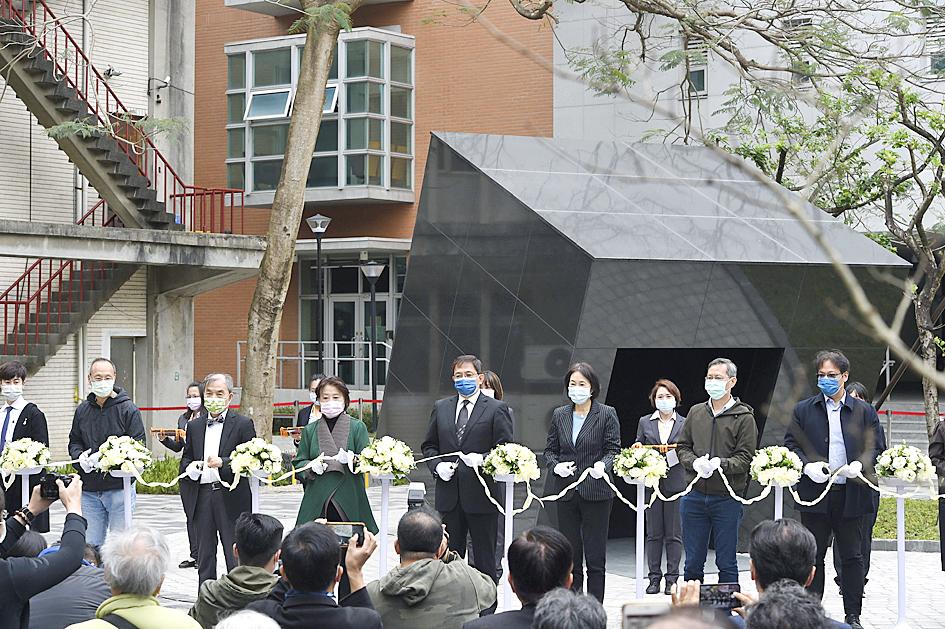A memorial in honor of democracy advocate Chen Wen-chen (陳文成) was officially inaugurated yesterday, as dignitaries and family members commemorated the mathematician who died under mysterious circumstances during the White Terror era.
Chen, an assistant professor of mathematics at Carnegie Mellon University, was visiting family in Taiwan when he was found dead near a library at National Taiwan University (NTU) on July 3, 1981.
A day earlier, the 31-year-old had been detained and interrogated by the Taiwan Garrison Command, a state security force that has since been disbanded.
Chen’s brother-in-law, Tai Hsien-ming (戴憲明), opened the dedication of the Dr Chen Wen-chen Incident Memorial Square (陳文成事件紀念廣場) at NTU with a violin performance, followed by remarks by university president Kuan Chung-ming (管中閔).
“The life of this innocent man stopped on this patch of lawn, causing his family forever irreconcilable grief,” Kuan said. “But it shocked people to their core, awakening Taiwanese to the pursuit of human rights, democracy and freedom.”
The memorial not only mourns the NTU alumnus, but also serves as a reminder of the other heroes who fought for Taiwan’s future, he said, calling for timely clarification of the truth so that the departed could be afforded peace.
Kuan also extended the school’s thanks to the Dr Chen Wen-chen Memorial Foundation, students and everyone who donated to create the memorial.
Foundation chairwoman Yang Huang Maysing (楊黃美幸) in her remarks gave historical context to the memorial.
“Today is a witness to history,” she said. “Forty years ago, Dr Chen Wen-chen fell on this spot.”
In 1984, Chen’s father traveled across the US to raise awareness of his son’s death, giving 135 talks and wearing a placard that read: “Give me the truth. Give me my son,” Yang said.
However, the Chinese Nationalist Party (KMT) obstructed the truth, even banning foundations from using Chen’s name until 2000, she said, urging the party to face its past sins, as well as publicly apologize and offer compensation to Chen’s family.
“Our history praises [then-president] Chiang Ching-kuo (蔣經國) as the driver of democracy,” she said. “This is the greatest insult to common sense.”
Today, even when facing intimidation by the Chinese Communist Party, Taiwanese are not afraid, because they believe “where there is a will, there is a way,” she added.
To those who doubt the circumstances surrounding Chen’s death, Tai presented a photograph of his brother-in-law, saying: “He is so bright, so confident; how could he have come here and committed suicide? You must be critical of authoritarian propaganda.”
NTU Students’ Association president Yang Tzu-ang (楊子昂) said that the memorial was designed around the concept of “emptiness” to represent the opacity of historical truth, and the blank terror of prison cells and interrogation rooms.
“Outsiders cannot see what insiders do,” Yang Tzu-ang said.
She also thanked generations of students for taking up the mantle after 10 years of rejection and stalemates with conservative school administrations.
The foundation in 2011 sent a letter to the NTU president requesting the creation of a memorial, but never received a response.
A year later, a student representative brought it up at a school affairs meeting, but the president at the time transferred the matter to the Gallery of NTU History.
The proposal finally passed in 2014 and a design competition began in 2016.
However, just as construction was set to begin in 2019, the newly instated Kuan rescinded the school’s promise to shoulder half of the cost and stopped soliciting donations, saying that he would be criticized either way as it is a sensitive political topic.
The foundation, student association and mathematics department rushed to reach the fundraising target on their own, raising NT$11 million (US$387,501) in only three months.
A donation agreement was inked with NTU, which provided NT$1 million, in February last year and construction began in July.
Source: Taipei Times - 2021/02/03





















